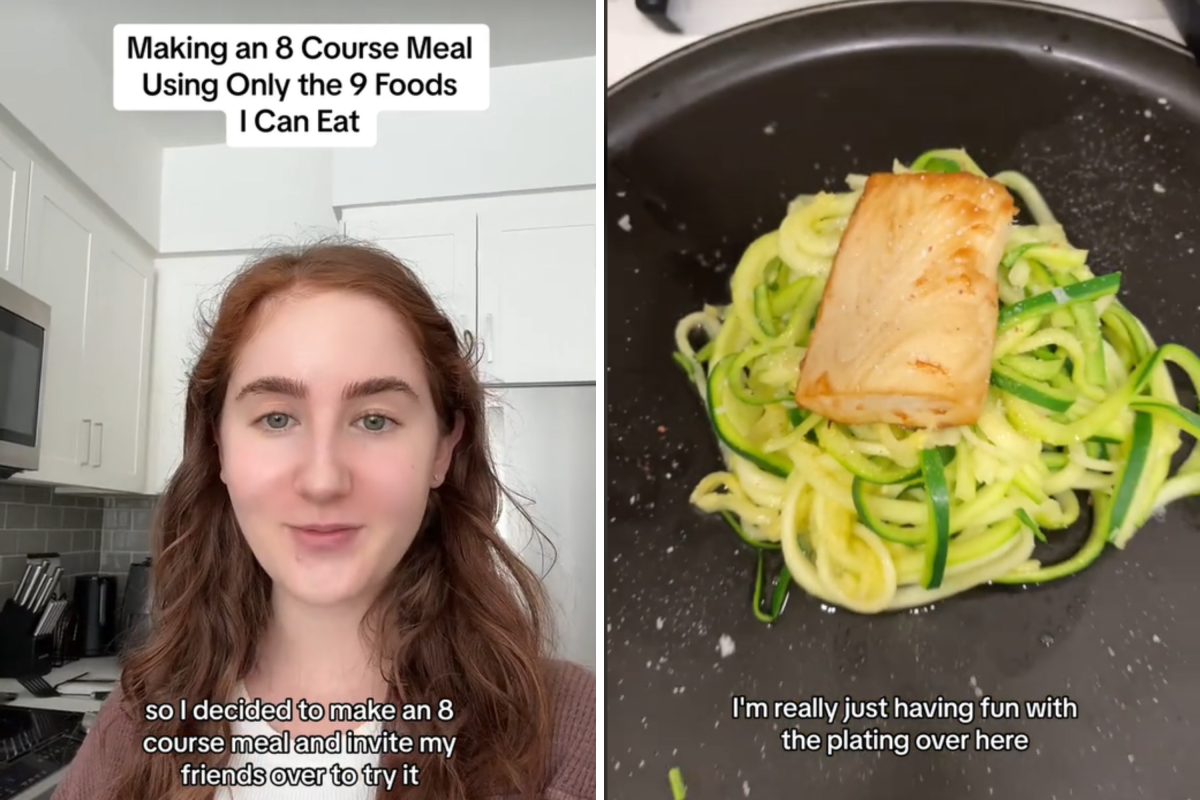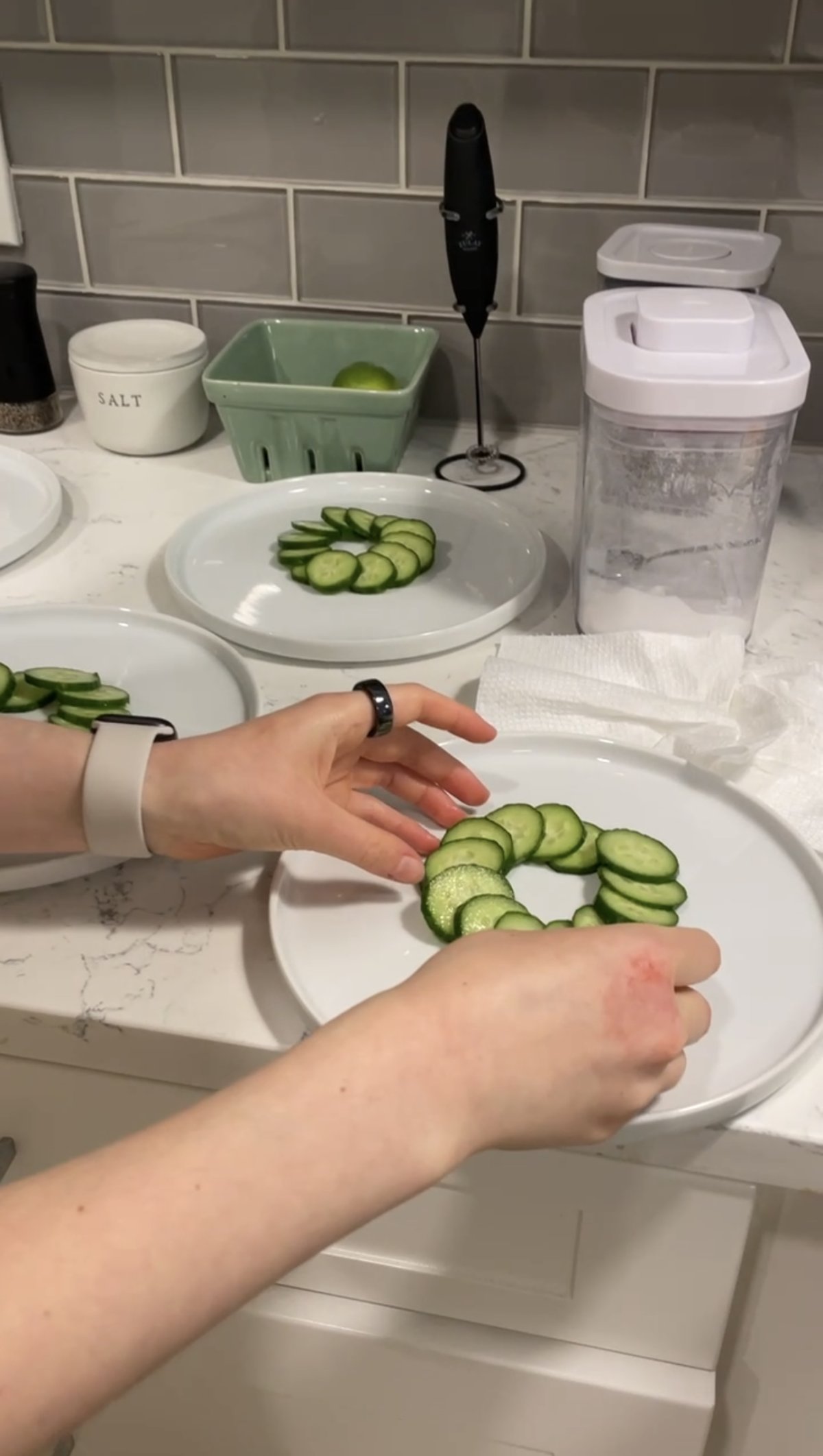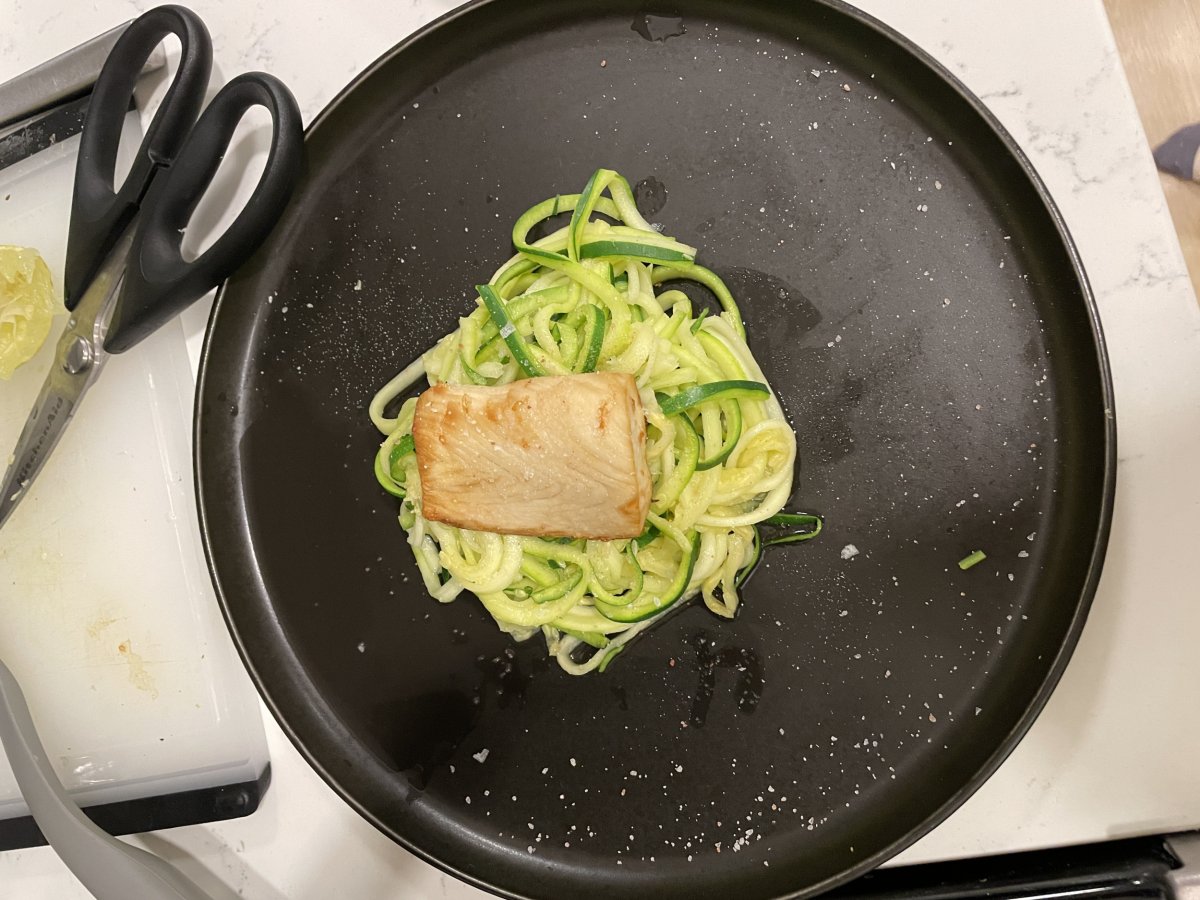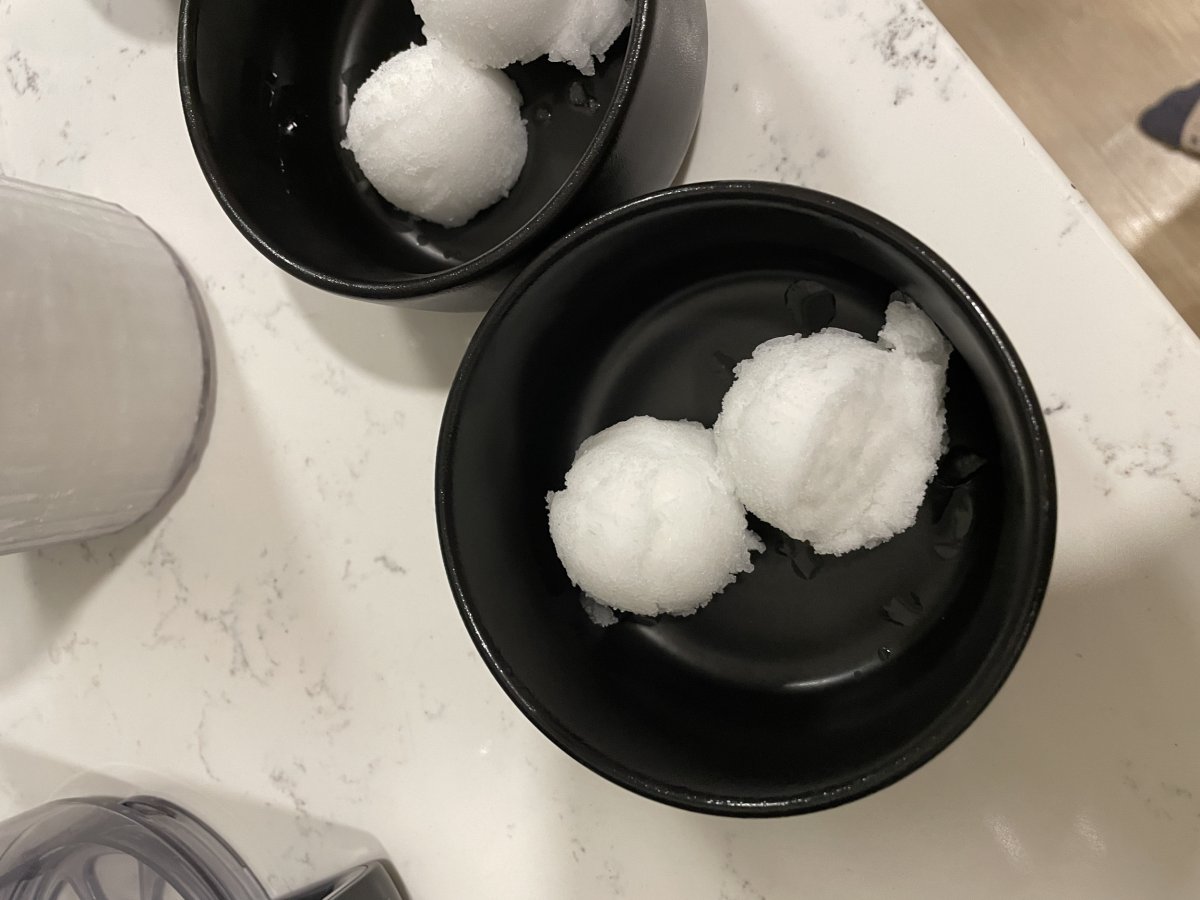A university student from Los Angeles has gone viral on social media after sharing an elaborate eight-course dinner menu that she made for her friends, using just eight ingredients in total.
Jenna Gestetner, 21, is affected by a rare condition that causes her over a hundred allergies and leaves her unable to eat most foods. Indeed, her diet is restricted to only a few foods and she eats a combination of those at every meal, plus a nutritional supplement. Hence the limited number of ingredients on her recent dinner menu.
“It really affects everything I do and the places that I go,” Gestetner told Newsweek. “I don’t know if there’s food I can eat at my school, so if I am going to be out all day I have to cook my food beforehand and bring it and that obviously takes a lot more thinking and planning.
“It is definitely very challenging,” she continued. “Then other days I’m with my friends and I suddenly realize ‘Oh, other people can just eat anything they want!’ Sometimes it makes me feel left out, like I’m not living the same kind of college experience that a lot of other people get to have.”
Jenna Gestetner
Growing up, Gestetner had lots of seemingly random, minor health issues, which doctors didn’t think much of. Even when she started reacting to foods and other things like materials and fragrances, doctors just said she was “sensitive.”
“When I was younger, I could eat basically everything, and then when I was about the age of 12 I started to develop all my allergies, and they developed over the course of about seven years,” Gestetner recalled.
“We believe the baseline of my disorder got worse when my hormones were changing a lot around the age of 12,” she said. “At the time, I had no clue what was happening and just thought it would go away. Many providers I saw thought I had ‘gut issues’ given most of my reactions were to food.”
She was eventually diagnosed with Mast Cell Activation Syndrome (MCAS) when she was 18. It’s a condition that causes the body to release too many chemical agents, resulting in a number of symptoms, which can sometimes include anaphylaxis or near-anaphylaxis attacks.
“Once I got a diagnosis, we looked back and realized the issues weren’t so random,” Gestetner added.

Jenna Gestetner
What is Mast Cell Activation Syndrome?
Mast Cell Activation Syndrome (MCAS) results in repeated, severe allergy symptoms affecting the entire body, including skin, gastrointestinal tract, heart, respiratory, and neurologic systems.
According to the Genetic and Rare Diseases Information Center, symptoms include episodes of abdominal pain, cramping, diarrhea, flushing, itching, wheezing, coughing, lightheadedness, rapid pulse and low blood pressure. The condition can start at any age, although it usually begins in adulthood, and its cause is still unknown.
Talking to Newsweek, Dr. Nathan Goodyear, medical director at Brio-Medical, explained that mast cells are immune cells, part of the innate immune system, which are typically actively involved in immune activation to allergens.
“The most well-known molecule secreted by mast cells is histamine, which drives the regular ‘allergy symptoms’ that send so many of us to the conventional drug or natural stores to seek aid in dampening the histamine response,” he said.
Gestetner explained that her allergies are different to what people would probably consider typical allergies.
She said: “Lots of people have asked me if allergies show up when I take a skin allergy test, and they do sometimes, but sometimes they don’t. Also, people with typical allergies can go to the doctor’s and get exposure therapies so that they can introduce allergens, but I can’t do that because of the condition I have.”
Allergic reactions are different for everyone with this condition and symptoms can vary in severity. People who are affected by MCAS are also more exposed to the risk of anaphylaxis, caused by the abnormally high number of mast cells and their potential to release large amounts of histamine into the blood.
“For me, it ranges,” Gestetner said: “I’ve never had anaphylaxis, although I do carry an epinephrine injector just in case because things can change. Sometimes I’ll get hives on my skin, a bit of difficulty breathing and I kind of feel it in my throat. It really does range depending on the food as well. Sometimes the reaction will just last like an hour, although it might last a few days.”
What Can You Eat With Extreme Food Allergies?
Tired of always being the one who can’t eat, or who has to bring her own special food, Gestetner decided to throw a dinner party for her friends, giving them a taste of what it’s like to live her life.
“My best friend loves to cook and on her birthday she threw a dinner party where she made a whole meal with all these really pretty foods, and everything was plated so nicely and it just looked so fun, everyone had fun being able to try these foods” she recalled. “And the whole time I just sat there, I mean, I brought my own food, but I didn’t get to have that same experience.

Jenna Gestetner
“So while I was sitting there, I was thinking, why can’t I have this experience? Like, why couldn’t I do this? There’s no reason why I couldn’t do it in my own way. So that’s where the idea came from.”
Using only the limited number of ingredients she can eat and a lot of creativity, Gestetner, came up with a special eight-course dinner menu for her friends.
“The foods I can eat are turkey, white fish, lime, olive oil, salt, zucchini, green beans, cucumber, and I have a supplement that I take to help fill in some of the other nutritional gaps, so some people don’t even count that,” she said.
Gestetner kicked off her dinner with a green starter, featuring sliced cucumbers, followed by an artistically arranged plate of crispy green beans. Next, she opted for zucchini with crispy fish crumbs served with a green bean and cucumber salad.

Jenna Gestetner
For her main dishes, she decided to go with two of her favorites, minced turkey stuffed zucchini boats, served with a cucumber and zucchini stack, finished with olive oil, and her everyday dinner dish, Mahi Mahi zucchini noodles topped with a grilled white fish fillet.
She couldn’t end her elaborate dinner party without a dessert, and so since her options are very limited, she made “sweet lime snow,” which she explained, is just a fancy name that she made up for lime-flavored shaved ice.
“My friends loved it!” she said, “I think they were secretly skeptical at first, especially since they are used to having a lot of seasonings and sauces on their food. They were surprised at how delicious the food was and how amazing each ingredient tasted.
“Every food has a natural taste that I get to enjoy because I am not masking it with seasonings. They also liked getting to experience, even just for one meal, how I eat.”

Jenna Gestetner
Living With Multiple Food Allergies
As a junior in college, Gestetner feels like her condition affects every aspect of her life.
“Even traveling is especially difficult, there is a lot of research on my part that I have to do, like finding hotels that would be able to help make food that I can eat or finding places with specific restaurants where I can eat, and that alone takes a lot of planning,” she said.
Gestetner shares her story on social media to connect with people who are struggling in a similar way and show that they can still live a typical life despite such conditions.
“I feel like the topic of health on social media is very toxic at both ends of the spectrum. Oftentimes in the chronic illness space, it’s like a competition of who’s sicker and just people showing that,” Gestetner explained. “It’s important to be able to relate to people and see that other people are struggling in the same way but you need to be more inspired, see somebody living with the same kind of challenges having fun.
“Then on the other end, there’s the picture-perfect health and wellness aesthetic content that gets millions of views, but that’s just not real life. I really want to show people that I can live a pretty typical life, even though my condition affects me every single day.”
Uncommon Knowledge
Newsweek is committed to challenging conventional wisdom and finding connections in the search for common ground.
Newsweek is committed to challenging conventional wisdom and finding connections in the search for common ground.


